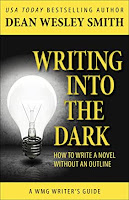If you want to earn money from writing, you need to write fast because you’re paid for what you do. You’ll earn the same amount of money for an article regardless of whether it took you 2 hours or 2 days to write it. So the faster you write, the more money you’ll earn.
Never make the mistake of thinking that writing fast means writing badly. In fact the opposite is true. The faster you write, the better you’ll write.
No doubt you’ve heard of the writing acronym, WAYS, Write As You Speak.
When you do this, it makes writing faster to do, and easier for the reader to understand. We’re always better understood when we’re explaining something in spoken words rather than writing it out in long convoluted words, which is why using WAYS works.
Readers aren’t looking for technical articles full of big words. They want fast information and an entertaining read.
In my book, How To Write An Article In 15 Minutes or Less, I show you how to quickly write short 300-500 word articles in 15 minutes or less, including research and proofing. It really can be done that fast.
Of course, speed comes with practice so the more articles you write, the faster and better you’ll get, plus you’ll be producing so much more work.
Short articles are always popular, but longer articles often earn more, especially if you’re paid by the word count.
To write an article quickly it’s good to have a simple outline containing an introduction, 3 points to cover and a conclusion. To expand it, each of the 3 points can have 3 sub-topics.
It can also be faster to turn each point or sub-topic into a question so that when you write your article you’re simply answering questions which is easier than justifying a statement. For instance if you were writing about a daily routine and you say, “I brush my teeth every morning.” You’d change that to, “Why do I brush my teeth every morning?” or “How do I brush my teeth?”
But no matter how you write your articles, it needs to be easy and enjoyable because if you don’t enjoy it, it won’t be sustainable. You won’t keep doing something you don’t enjoy.
Writing fast is enjoyable. It’s much more fun than writing slowly and trying to edit as you write and second guessing yourself all the time. Writing fast means there’s no time for any of that, and you’ll get a lot more writing done.
One of the most prolific authors was, Isaac Asimov, who wrote over 400 novels plus hundreds of scientific papers.
When asked about his amazing output he said, “I guess I’m prolific because I have a simple and straightforward style.”
This was a man who wrote fast, and he wrote for hours every day. And as he said, he kept his writing simple and straightforward which means he used WAYS, and you should too.
Handwriting or Keyboard?
There is always the age-old question of whether it’s better to write by hand or type everything straight on the keyboard.
There is no one-answer-fits-all to this because it all depends on what you’re most comfortable with.
Personally, I prefer to write by hand, and I always do, which means I have to type it all up later.
This may seem like a slow way to work, but for me it’s actually faster.
I’m far more creative when I write by hand so when I sit down with my notebook and pen I can write for hours and the ideas flow.
But when I try to write at the keyboard, the ideas don’t come as easily and my writing doesn’t flow as well. Even having a detailed outline doesn’t help. I end up using any excuse to get up and walk away for a while, but it’s no better when I sit back down again.
So while handwriting is slower than typing, it’s faster for me because it keeps me in the writing flow. I’m also a fast typist when I’m copying something that I’ve already handwritten.
I use the free grammar and spelling apps, Grammarly and Hemmingway to go over my work and check for typos, and ‘passive voice’ amongst other things.
Auto-correct also helps me to keep up with typing errors, although it doesn’t get everything right.
Once, when I bought a new computer, auto-correct kept changing my husband’s name, Dean, to Dead. It took me a few weeks to convince it that my husband wasn’t Dead. Shortly afterwards I was writing an article for someone about Ocean Dead Zones. But when I finished it I realized that auto-correct had changed it all to Ocean Dean Zones. This is why it’s important to check every word of your articles because even when you spell things correctly, it can be sabotaged.
Handwriting works for me because it helps me to stay in the zone and keep writing, and sticking with writing is THE most important thing. It’s so easy to get distracted and forget where you were up to, which is what happens when you’re not loving what you do.
So write your preferred way (handwriting or typing) and keep going. Once you start writing, don’t stop.
Using an outline is essential so that you can stay on topic, and when you finish writing for the day, it’s easy to pick up where you left off because all your outlines are ready and waiting to go.
When you’re writing, if you misspell something, leave it, you’ll pick it up in the edit. And if you can’t think of a word, leave a blank space and keep going. Once you start writing you must keep going.
And don’t worry if you think you’re going wrong, just keep writing.
I find that no matter how many errors I think I’m making, or if I think I’m not saying something the right way, I can easily pick up mistakes later and there’s never any need for much editing because I was always on track thanks to writing fast and staying in the writing zone.
And one last thing to remember is to always keep your reader in mind because as they read your articles, they’ll be asking themselves So what? Who cares? What’s in it for me? So make sure your articles always answer this.
But before you can do any of this, you’ll first have to know what to write about.
This is a short extact from The Monthly Challenge Writing Series:
Book 3 - Fast & Profitable Article Writing
Grab a copy now at:
https://www.cheritonhousepublishing.com/books/MCWS3.html


















